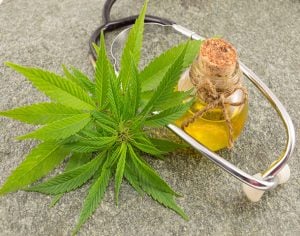
A few months ago, I discussed the legality of lesser-known hemp-derived cannabinoids which appeared to be gaining success in the United States. One of these promising cannabinoids is cannabinol (CBN). Put simply, CBN is a non-intoxicating cannabinoid that results from the degradation of THC. Because it is difficult, if not impossible, to grow CBN-rich strains of hemp, most of the CBN found on the U.S. market is the product of decarboxylation — a chemical reaction that converts other cannabinoids, such as cannabidiol (CBD) and tetrahydrocannabinol (THC), into CBN. This conversion process creates some confusion regarding the legal status of CBN.
Although CBN is not expressly listed under the federal Controlled Substances Act (the CSA), the cannabinoid is a Scheduled I controlled substance when derived from marijuana. The CSA defines “marihuana” to mean “all parts of the cannabis plant” except the stalks and nonviable seeds. Because neither the stalks nor nonviable seeds contain meaningful amounts of cannabinoids, CBN squarely falls under the definition of marijuana and, as a result, is a controlled substance.
On the other hand, CBN derived from hemp is not a controlled substance and, thus, may be lawful. This is true for two reasons. First, the Agriculture Improvement Act of 2018 (the 2018 Farm Bill) expressly removed “hemp” from the CSA definition of marijuana. Second, the 2018 Farm Bill defines “hemp” as “all parts” of the cannabis plant, including cannabinoids, with a THC concentration that does not exceed 0.3% on a dry weight basis. Accordingly, CBN is probably lawful if derived from hemp.
Nevertheless, some argue that CBN, regardless of its source, is a controlled substance because it is produced from the degradation of THC. The proponents of this argument generally rely on two theories.
The first theory is premised on the federal Analogue Act (the AA). The AA treats any substance intended for human consumption that resembles a Schedule I or II substance in its chemical make-up and effect on the human body as if it were a CSA Schedule I or II controlled substance. But should the AA apply in this context?
The CSA expressly excludes “tetrahydrocannabinols [all forms of THC] in hemp” from the list of Schedule I controlled substances. Moreover, the effects of CBN are not “substantially similar” to those of THC. In fact, its effects are significantly less potent. Therefore, CBN that stems from hemp-derived THC should not be deemed a controlled substance analogue.
The second argument is based on the literal interpretation of “tetrahydrocannabinols in hemp,” and thus, that only CBN derived from THC “in hemp” is lawful. The reasoning here is that trace amounts (no more than 0.3%) of THC that naturally occur in the hemp plant are lawful, but THC that is extracted and isolated from the hemp plant is unlawful. This analysis fails to account for the fact that the 2018 Farm Bill expressly legalized “derivatives, extracts, [and] cannabinoids,” most of which must go through a processing phase that inevitably increases the THC concentration. Accordingly, it is reasonable to infer that Congress intended to legalize processed hemp (i.e., cannabinoids not “in hemp”) as well.
However, as reasonable as this statutory interpretation is, it fails to resolve the position taken by some law enforcement groups that treat processed hemp containing more than 0.3% THC as marijuana (i.e., a controlled substance), even if the THC concentration only increases fleetingly during the processing phase.
Consequently, though it seems clear that hemp-derived CBN should not be treated as a Schedule I controlled substance analogue, it is unclear whether CBN that results from processed hemp-derived THC is lawful, given the confusing legal status of THC not “in hemp.”
This lingering uncertainty regarding the legal status of CBN will likely need to be addressed through legislation or the courts. In the meantime, producing CBN from THC extracted from hemp should be done cautiously and with the understanding that this lesser-known cannabinoid may be treated as a controlled substance under the CSA, even if Congress did not consider or intend this result.
Nathalie practices out of Harris Bricken’s Portland office and focuses on the regulatory framework of hemp-derived CBD (“hemp CBD”) products. She is an authority on FDA enforcement, Food, Drug & Cosmetic Act and other laws and regulations surrounding hemp and hemp CBD products. She also advises domestic and international clients on the sale, distribution, marketing, labeling, importation and exportation of these products. Nathalie frequently speaks on these issues and has made national media appearances, including on NPR’s Marketplace. For two consecutive years, Nathalie has been selected as a “Rising Star” by Super Lawyers Magazine, an honor bestowed on only 2.5% of eligible Oregon attorneys. Nathalie is also a regular contributor to her firm’s Canna Law Blog.

